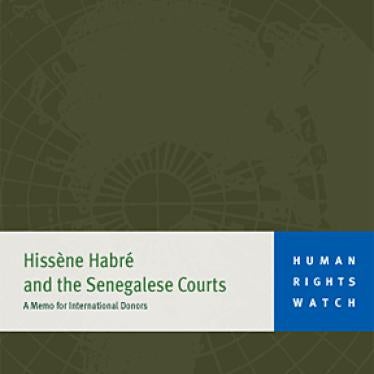(Brussels)- Senegal’s adoption today of a constitutional amendment confirming that Senegalese courts can prosecute past crimes against humanity lifts any legal obstacles to the trial of former Chadian dictator Hissène Habré, Human Rights Watch said today.
Habré is accused of massive crimes during his 1982-1990 rule before he fled to Senegal. In July 2006, the African Union mandated Senegal to “prosecute and ensure that Hissène Habré is tried, on behalf of Africa, by a competent Senegalese court.” Senegal has yet to initiate a prosecution, however.
In February 2007, Senegal passed legislation permitting it to prosecute cases of genocide, crimes against humanity, war crimes and torture, even when they are committed outside of Senegal. Today’s amendment makes clear that the law applies to such crimes even when they were committed before the law was passed.
“Senegal now has one of the world’s strongest laws for prosecuting atrocities,” said Reed Brody, Human Rights Watch’s counsel who works with Habré’s victims. “Now it’s time to get down to the real business and start investigating Habré’s alleged crimes so that, after 18 years, his victims can finally see justice done.”
Also today, Senegal’s justice minister M. Madické Niang, announced that three judges and two prosecutors had been named to work on the Habré case.
Human Rights Watch welcomed the constitutional amendment and the naming of the judges, but pointed out that it has been two years since the African Union mandate was given and more than eight years since Habré was first indicted in Senegal.
The constitutional amendment says that the principle of the non-retroactivity of criminal law does not bar the prosecution of acts “which, when they were committed, were criminal according to the rules of international law relating to genocide, crimes against humanity and war crimes.” This amendment is in harmony with article 15 (2) of the International Covenant on Civil and Political Rights, ratified by Senegal, which states that the non-retroactivity principal does not bar the prosecution of an act “which, at the time when it was committed, was criminal according to the general principles of law recognized by the community of nations.”
In January 2008, at Senegal’s request, European Union experts visited Senegal to evaluate its financial and technical needs. The experts called on Senegal to define a prosecution strategy and set forth a precise calendar and a reasonable budget, none of which has been done.
Background
Hissène Habré ruled Chad from 1982 until he was deposed in 1990 by President Idriss Déby Itno and fled to Senegal. His one-party regime was marked by widespread atrocities, including waves of ethnic campaigns. Files of Habré’s political police, the DDS (Direction de la Documentation et de la Sécurité), which were discovered by Human Rights Watch in 2001, reveal the names of 1,208 persons who were killed or died in detention. A total of 12,321 victims of human rights violations were mentioned in the files.
Habré was first indicted in Senegal in 2000 before courts ruled that he could not be tried there. His victims then turned to Belgium and, after a four-year investigation, a Belgian judge in September 2005 charged Habré with crimes against humanity, war crimes, and torture.
Following a Belgian extradition request, Senegalese authorities arrested Habré in November 2005. The Senegalese government then asked the African Union to recommend how to try Habré. On July 2, 2006, the African Union, following the recommendation of a Committee of Eminent African Jurists, called on Senegal to prosecute Habré “in the name of Africa,” and Senegalese President Abdoulaye Wade declared that Dakar would do so.






